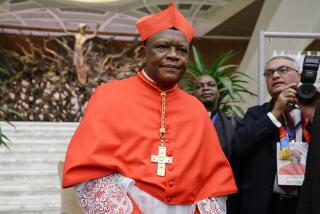Church leader tackles unease
Archbishop of Canterbury Rowan Williams suggested Monday that the Episcopal Church might have to accept a different role within the worldwide Anglican Communion amid U.S. leaders’ decision to lift a de facto ban on gay bishops and to consider rites of blessing for same-sex unions.
Williams outlined his concerns in a statement to leaders throughout the communion, saying “very serious anxieties have already been expressed” among the 77 million Anglicans. The Episcopal Church, the U.S. branch of Anglicanism, adopted the new policies during a 10-day convention in Anaheim that ended July 17.
Williams, spiritual leader of the communion, spoke of a “two-tier” or “two-track” model -- one path for those who remain part of the communion’s “covenantal structure,” and another with “fewer formal expectations” for those who value autonomy.
“It helps to be clear about these possible futures, however much we think them less than ideal, and to speak about them not in apocalyptic terms of schism and excommunication but plainly as what they are -- two styles of being Anglican, whose mutual relation will certainly need working out,” Williams wrote.
Tensions between the U.S. church and global Anglicans have mounted since the 2003 consecration of an openly gay bishop in New Hampshire. That led to the departure of dozens of churches and four dioceses, including one in Central California.
The church’s presiding bishop, the Most. Rev. Katharine Jefferts Schori, did not respond to Williams’ letter Monday, a spokeswoman said.
But Jefferts Schori and another senior church leader tried to allay Anglican fears during the recent convention. In a letter to Williams and the communion’s 38 other worldwide regional leaders, they described the resolution on gay bishops as “more descriptive than prescriptive in nature.” They said the measure did not repeal an earlier ban on such ordinations, but instead reaffirmed commitments made by U.S. church laws, which bar discrimination based on sexual orientation.
“In adopting this resolution, it is not our desire to give offense,” they wrote. “We remain keenly aware of the concerns and sensibilities of our brothers and sisters in other churches across the communion.”
Episcopalians greeted Williams’ letter with a range of emotions. Some criticized him, saying his proposals would relegate their church to second-class status. Others said they were gratified that Williams, who attended part of the recent convention, condemned persecution of gays and lesbians and recognized the U.S. church’s commitment to the global communion.
“Now the question is, how do we proceed together as Anglicans across the globe,” said Rebecca Wilson, communications director for the Chicago Consultation, an advocacy group that supports the full inclusion of gays and lesbians in the worldwide communion.
--
More to Read
Sign up for Essential California
The most important California stories and recommendations in your inbox every morning.
You may occasionally receive promotional content from the Los Angeles Times.










